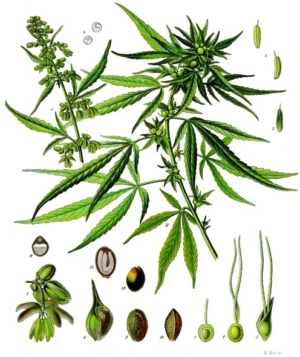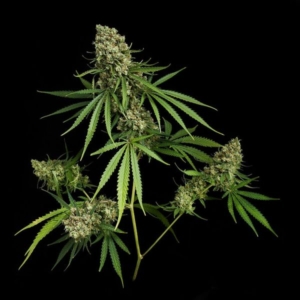Emerging Disruptors in Cannabis
Worldwide – Virtually
December 9, 2025
Welcome to the Emerging Disruptors in the Cannabis Industry Conference. Join investors, dealmakers, and representatives from the cannabis sciences industry. Listen to CEOs of some of the most dynamic cannabis science companies discuss the latest innovations in cannabis products. Don’t miss this opportunity to learn about groundbreaking developments shaping the future of cannabis. Attend virtually on December 9, 2025.

The U.S. cannabis market was valued at $38.5 billion in 2024 and is expected to grow at a CAGR of 11.5%, reaching $76.4 billion by 2030.

 Not so great. The U.S. Cannabis Spot Index, which tracks wholesale prices in 22 states, sat at $955 a pound in early March 2025, down from its peak of $2,133 in September 2015. In 2024, roughly 27% of cannabis businesses were profitable, down from 42% in 2022. Nearly a third are unprofitable, with the rest breaking even.
Not so great. The U.S. Cannabis Spot Index, which tracks wholesale prices in 22 states, sat at $955 a pound in early March 2025, down from its peak of $2,133 in September 2015. In 2024, roughly 27% of cannabis businesses were profitable, down from 42% in 2022. Nearly a third are unprofitable, with the rest breaking even.
Cannabis operators still vie for consumer dollars with illegal dealers who avoid taxes and regulatory costs. Also, several states that legalized marijuana don’t cap the number of licenses and have reduced criminal penalties for black-market players, contributing to oversaturation. Adding to the plight of cannabis companies, since cannabis is still federally illegal, pot businesses haven’t been allowed to seek protection from creditors in a U.S. bankruptcy court to restructure obligations in an orderly way.
The following are among the key drivers for the cannabis industry:
Legalization and Regulatory Frameworks: The increasing legalization of both medical and recreational cannabis worldwide has been a major driver. Countries like Canada, Thailand, and Uruguay, along with numerous U.S. states, have legalized cannabis, creating significant market opportunities.
opportunities.
Medical Applications: Cannabis is gaining acceptance as a treatment for conditions like chronic pain, anxiety, epilepsy, and more. (See below.)
Social Acceptance: Declining stigma around cannabis use has led to wider consumer acceptance.
Technological Advancements: Innovations in cultivation techniques, such as precision irrigation and crop steering, have improved efficiency, sustainability, and product consistency.
Product Diversification: The introduction of new cannabis products like edibles, beverages, concentrates, and CBD-dominant items has attracted a broader consumer base. These products offer discreet and controlled consumption options.
The following are among the applications of cannabis directed towards medical treatment:
 Pain Management: Chronic pain, including neuropathic pain and pain from conditions like arthritis and cancer, is one of the most common uses of medical cannabis. Cannabinoids like THC and CBD have shown promise as pain relievers, though evidence varies in quality.
Pain Management: Chronic pain, including neuropathic pain and pain from conditions like arthritis and cancer, is one of the most common uses of medical cannabis. Cannabinoids like THC and CBD have shown promise as pain relievers, though evidence varies in quality.
Nasea and Appetite Stimulation: Effective for controlling nausea and vomiting caused by chemotherapy. Cannabis helps improve appetite and reduce weight loss in patients with HIV/AIDS or cancer-related wasting syndrome.
Neurological Disorders: Cannabis is used to treat epilepsy (e.g., FDA-approved Epidiolex for rare seizure disorders like Lennox-Gastaut and Dravet syndromes).
Mental Health Conditions: Cannabis shows potential for reducing symptoms of post-traumatic stress disorder (PTSD) and anxiety disorders
Autoimmune Diseases: Cannabinoids’ anti-inflammatory properties make them promising for conditions like rheumatoid arthritis, Crohn’s disease, and multiple sclerosis.
Other Applications: Cannabis may help with glaucoma, insomnia, fibromyalgia, anorexia, migraines, and inflammatory bowel disease.
The following are among the applications of cannabis directed towards medical treatment:
Pain Management: Chronic pain, including neuropathic pain and pain from conditions like arthritis and cancer, is one of the most common uses of medical cannabis. Cannabinoids like THC and CBD have shown promise as pain relievers, though evidence varies in quality.
Nasea and Appetite Stimulation: Effective for controlling nausea and vomiting caused by chemotherapy. Cannabis helps improve appetite and reduce weight loss in patients with HIV/AIDS or cancer-related wasting syndrome.
Neurological Disorders: Cannabis is used to treat epilepsy (e.g., FDA-approved Epidiolex for rare seizure disorders like Lennox-Gastaut and Dravet syndromes).
Mental Health Conditions: Cannabis shows potential for reducing symptoms of post-traumatic stress disorder (PTSD) and anxiety disorders
Autoimmune Diseases: Cannabinoids’ anti-inflammatory properties make them promising for conditions like rheumatoid arthritis, Crohn’s disease, and multiple sclerosis.
Other Applications: Cannabis may help with glaucoma, insomnia, fibromyalgia, anorexia, migraines, and inflammatory bowel disease.
Capital flowing into the cannabis industry is dwindling. In 2024, U.S. private equity deals in the cannabis sector totaled $260 million, compared with $1.3 billion in 2018. During the same year, venture-capital deals amounted to $410 million, compared with roughly $3.06 billion in 2019. Further, U.S. pot companies now owe more than $2.5 billion in debt that comes due before the end of 2026. Nevertheless, the first two months of 2025 witnessed the following acquisitions:
- MariMed completed an $11 million acquisition of Delaware-based First State Compassion Center, expanding its footprint in the U.S. market.
- Canopy Growth finalized its acquisition of Acreage Holdings for $21.2 million in shares, along with completing deals for Wana Wellness and Jetty Extracts.
- High Tide entered the German medical cannabis market by acquiring Purecan GmbH.
- SNDL was selected as the successful bidder to acquire Canadian cannabis company Indiva, enhancing its product offerings.
Here are some recent capital raises by cannabis companies:
- Cannect Wellness raised $7 million in its second equity funding round, bringing its total equity financing to $14.5 million.
- Sweet Leaf Madison Capital secured $250,000 in venture funding to provide financing services tailored to the cannabis industry.
- Christina Lake Cannabis received CAD 3.10 million through a private placement for development capital.
- Vireo Growth raised $8.10 million through a private placement to support its mission of providing safe access and quality cannabis products.
- Mile High Labs secured $25.50 million in venture funding from Highlands Venture Partners and other investors to expand its cannabidiol and cannabigerol product offerings.
- Budscout raised $1.43 million in Seed-2 funding for its cloud-based SaaS platform aimed at improving operational efficiency in the cannabis sector.
- Claybourne Co. announced a $17.5 million oversubscribed capital raise to support its growth as a California-based cannabis company.

Each management team will discuss their company’s existing and forthcoming product offerings. They will apprise listeners of their addressable markets and expectations for customer segments served. They will inform us of their research and development efforts, proprietary technologies and patent portfolios. They will tell us about their business models including the extent of their collaborations, licensing strategies, distribution channels, expansion efforts, manufacturing strategies, milestones and exit strategies.
Please check back for the agenda of presenting companies. If you would like to nominate a company to present, please contact Gustavo Yrepa at gustavo@davosinthedesert.us.
Registration is free for members of Davos in the Desert. The registration price for non-members is just $10. Registration is for one attendee. No refunds.


